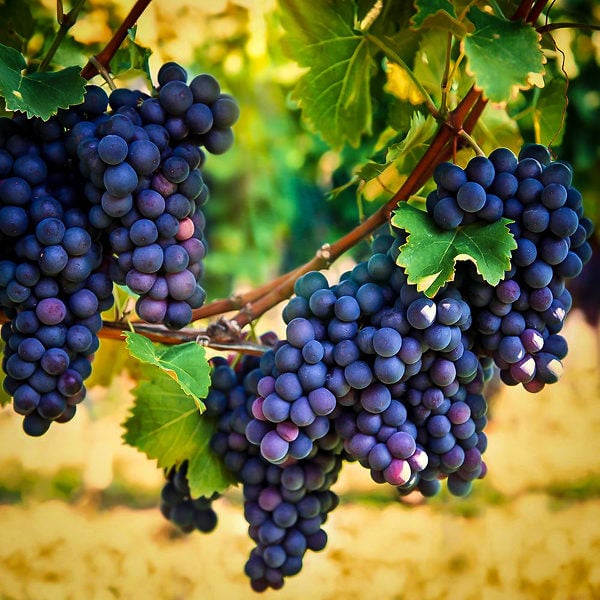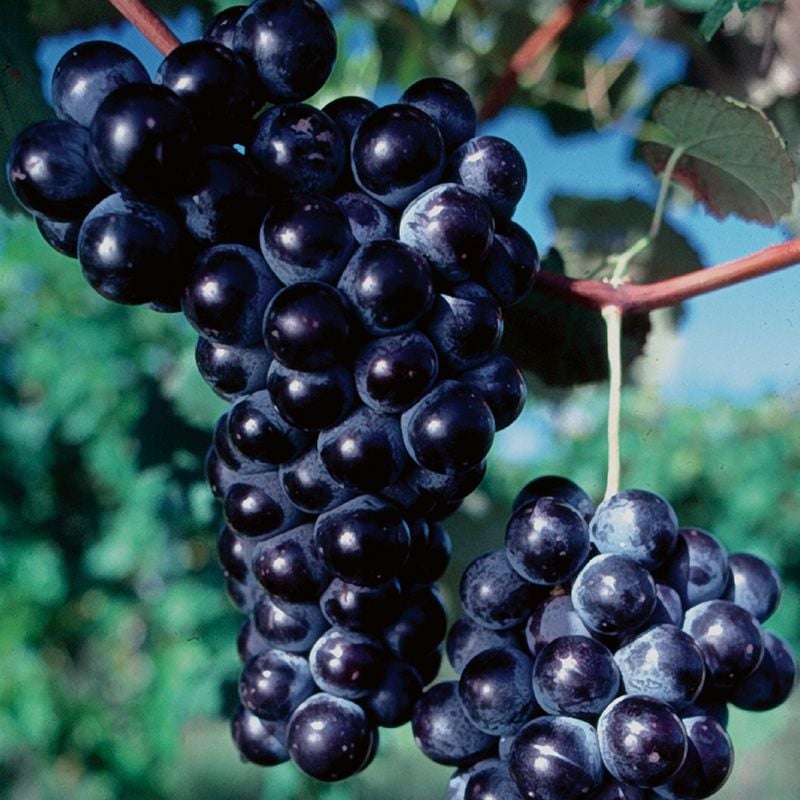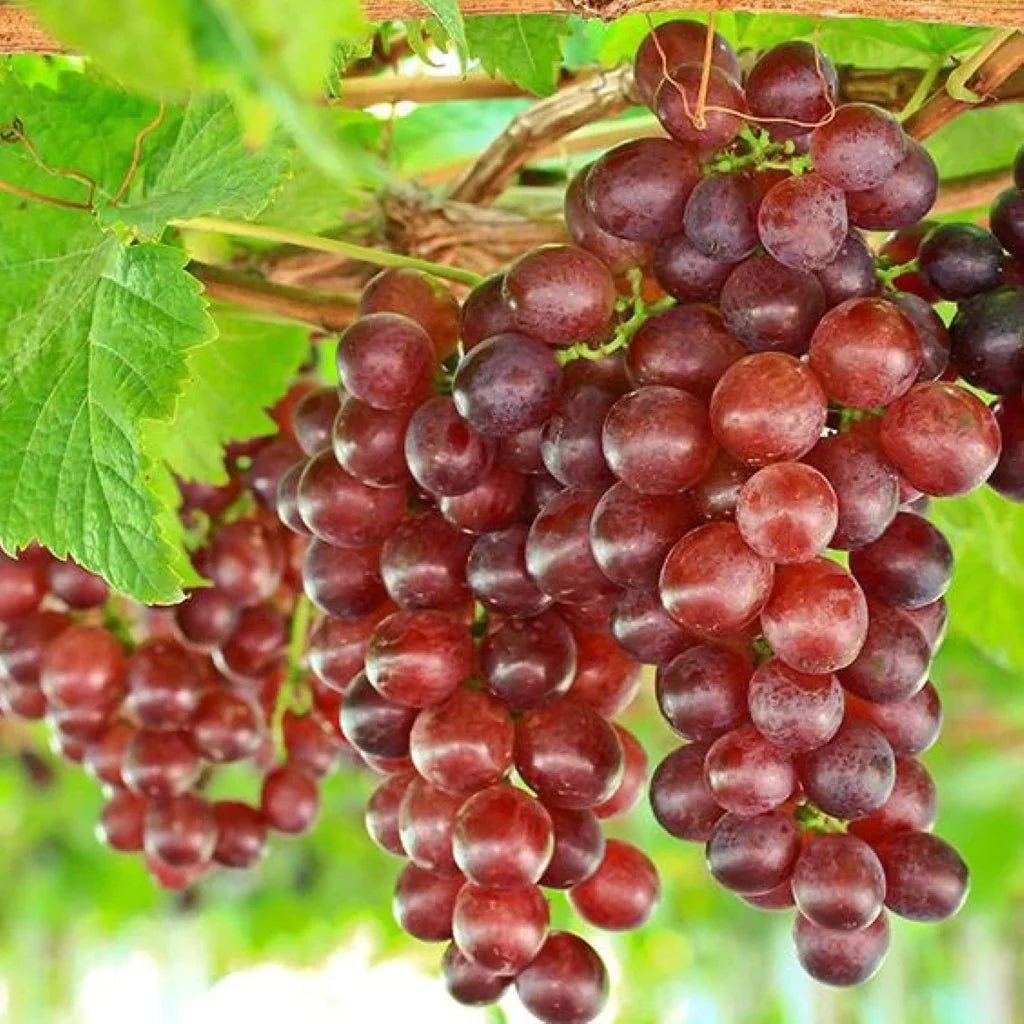





Grape Vine 3-4'
Shipping Information:
NowWe sell bare root plants - click here to see what you'll receive
Grape Vine - Vitis Vinifera
Our grape vines are mature and XL, fruit-bearing age. You're not just getting a tiny plant, but a large 3'+ plant. We have four varieties in stock. These go fast.
Fresh Dug, Exact Images Of Our Grape Vines Dug Today
Have you ever seen roots like our mature, fruiting types? Plant these and have a vineyard now! Buy elsewhere for $188, But Why? We are a DTC Brand, Grower, and Direct to the public. Will these last long? Absolutely not!
Concord, scientifically known as Vitis labrusca 'Concord,' is a mesmerizing and robust addition to any garden or vineyard. These are renowned not just for their delectable fruit but also for their captivating beauty and symbolism.
These Grape Vines Can Get Huge
The Concord is a deciduous woody type that can reach impressive lengths, often stretching up to 20-30 feet or even more. Its thick, gnarled stems boast a rustic charm, with bark that peels in shreds to reveal the plant's history and endurance. As the plant matures, it takes on a rugged appearance, its woody tendrils intertwining, creating intricate patterns against the sky.
Concord transforms dramatically throughout the seasons, each phase offering unique visual appeal. In spring, tender green leaves emerge, unfurling like delicate umbrellas. These leaves are deeply lobed and alternate along the plant, offering a lush, vibrant backdrop to the emerging clusters of flowers. Come early summer, the Concord bursts into a symphony of colors. Small, fragrant flowers appear, adorning the plant with clusters of delicate petals ranging from creamy white to pale green. These blossoms serve as pollinators' havens, attracting bees, butterflies, and other insects, contributing to the local ecosystem's vitality.
As summer progresses, these blossoms give way to Concord's signature fruit, the clusters. They are small to medium-sized, with a deep, rich purple-black hue that seems to absorb sunlight. These fruit clusters hang gracefully from the plant, suspended like jewels.
The plants continue to mature through the summer, becoming plumper and succulent. Their thick, abundant foliage provides valuable shade. This lush canopy offers a serene refuge from the heat, making the area beneath the plant an inviting retreat during the hottest months.
In the fall, as temperatures drop and daylight hours shorten, the leaves of the Concord undergo a breathtaking transformation. Their green hues shift to warm, earthy tones, ranging from profound reds to brilliant yellows and oranges. The plant's leaves appear ablaze with the colors of autumn, casting a captivating and magical spell over any observer.
Concord is more than just botanical wonders; it symbolizes endurance and the passage of time. They embody the cycle of life, from the tender beginnings of spring to the fruitful abundance of summer and the graceful aging of autumn. These plants offer delicious fruit and a timeless beauty that enchants the senses and connects us to the natural world's rhythms and mysteries.
Cawtaba
Catawba (Vitis labrusca 'Catawba') is a captivating and robust variety that embodies the essence of American viticulture. These plants are renowned for their historical significance, versatility, and unique aesthetic qualities, making them an enchanting addition to any vineyard or garden.
Catawba has grown with care and attention for over two centuries, showcasing the best American winemaking. Its rich history is a testament to the passion and dedication of generations of vintners who have nurtured this plant to produce exceptional wines enjoyed by wine lovers worldwide. Catawba is a true gem of American winemaking. Originating in the Catawba River Valley of North Carolina, this cultivar quickly gained popularity due to its adaptability to diverse climates and its resilience in harsh weather conditions.
Catawba exhibits an extraordinary vitality that extends beyond their practical use. These plants boast stunning ornamental qualities with lush, heart-shaped leaves that transform into a vivid kaleidoscope of autumnal hues, ranging from fiery reds to deep purples. In the spring, they bloom with delicate, fragrant flowers that beckon pollinators with their ethereal beauty.
The tendrils of Catawba wind and curl their way up trellises and arbors, creating a mesmerizing labyrinth of greenery that evokes a sense of timeless elegance. Their slender stems and gracefully arching canes lend an artistic touch to terrains, making them a favored choice.
Furthermore, Catawba contributes to biodiversity by providing shelter and sustenance for wildlife, from songbirds to insects. Their presence in a garden or vineyard undoubtedly establishes a harmonious ecosystem that truly reflects nature's intricate interconnectedness.
In conclusion, Catawba is more than just a fruit source; it symbolizes resilience, history, and natural beauty. These plants can transform any space into a tranquil oasis, where the echoes of the past meet the promise of the future and where nature's artistry is on full display for all to admire.
Fredonia Vine
Fredonia, known scientifically as Vitis labrusca 'Fredonia,' is a captivating and revered cultivar in viticulture. These are not simply plants but living tapestries of nature's artistry and the embodiment of agricultural heritage. While their primary purpose may not be for consumption, the Fredonia offers many remarkable qualities and characteristics that make them a cherished addition to gardens, landscapes, and vineyards.
These plants are renowned for their vigorous growth and resilience, displaying a remarkable vitality that allows them to thrive in various climates and soils. Their robust nature can withstand harsh weather conditions, making them a favorite among horticulturists and viticulturists. Fredonia possesses a remarkable ability to adapt, embodying the enduring spirit of nature itself.
One of their most distinctive features is their foliage. The leaves are large, heart-shaped, and deep green. They provide an attractive backdrop to the fruit clusters and are vital to the plant's photosynthesis and overall health. The foliage crinkles gently in the breeze, creating a soothing sound that contributes to the serene ambiance of the garden or vineyard.
In the spring, these plants burst forth with clusters of small, spherical types, each a unique masterpiece of nature. These berries can also be utilized for ornamental purposes, as they lend an air of sophistication to any landscape.
As the seasons progress, Fredonia offers a captivating display of color transformation. In the fall, the leaves undergo a breathtaking metamorphosis, turning vibrant shades of crimson, orange, and gold. This autumnal spectacle transforms the landscape into a picturesque scene, evoking a sense of nostalgia and wonder.
Beyond their aesthetic appeal, Fredonia also holds cultural significance. They connect to the time-honored winemaking tradition, weaving the past and present in a tangible tapestry of heritage. With their history and enduring beauty, these plants are a testament to humanity's deep-rooted relationship with the land and its fruits.
In conclusion, Fredonia are more than just plants; they embody nature's resilience, beauty, and cultural significance. These vines offer a symphony of visual and tactile delights throughout the seasons, enriching our lives with their enduring presence. Whether in a garden, landscape, or vineyard, Fredonia is a testament to the enduring bond between humans and the natural world.
They Stunning Foliage
Niagara (Vitis labrusca 'Niagara') is a fascinating embodiment of nature's intricate design.
Niagara belongs to the Vitis labrusca species and is native to the eastern United States and southeastern Canada. It is esteemed for its lush, verdant foliage, which unfurls in late spring and transforms into a luxuriant sea of green as the growing season progresses. The leaves are characterized by their distinctive three-lobed shape, showcasing serrated edges that catch the sunlight, creating a mesmerizing play of shadows and light.
What truly distinguishes Niagara, however, is its intricate tendrils. These delicate, curling structures emerge from the plants nodes, seeking support as they gracefully wrap around nearby objects. As the tendrils embrace their chosen support, they stabilize the plant and enable it to reach for the heavens. It's a testament to nature's ingenuity, as these tendrils ensure the plants upward ascent, a poetic dance of growth and adaptability.
The Niagara undergoes a remarkable transformation throughout the summer as clusters of small, greenish-white flowers emerge. Each blossom carries an enchanting fragrance, attracting pollinators such as bees and butterflies and contributing to the ecosystem's vitality. These blossoms eventually give way to small, green berries that gradually mature into the luscious, translucent orbs for which the plant is known. However, in the context of this description, we must resist the temptation to delve into the culinary realm of these, focusing instead on the aesthetic and ecological aspects.
Niagara undergoes another stunning metamorphosis in autumn as its leaves and tendrils turn brilliant shades of red, orange, and gold. This fiery display against the backdrop of deep green plants is a striking testament to the vibrancy of the natural world during the changing seasons. It's a sight that captures the essence of transition and the ever-evolving beauty of our environment.
Niagara also provides habitat and sustenance for various wildlife species in their natural splendor. Birds often find refuge among the foliage, feasting on insects and seeking shelter within the tangled labyrinth of plants. Small mammals may also utilize the plant's dense growth for protection and nesting.
In conclusion, the grape vine Niagara is more than just a source of delicious fruit; they are a symphony of botanical artistry, adaptability, and ecological significance. These plants evoke a sense of wonder within the natural world with their tendrils, foliage, blossoms, and seasonal transformations. Niagara reminds us of nature's ceaseless creativity and its intricate interplay of form and function, from the delicate tendrils reaching for support to the vibrant autumnal display.
TN Nursery Has Many Varieties Of Them
| Planting zone | [4, 5, 6, 7, 8, 9, 10] |
|---|---|
| Height At Maturity | Under 10 Feet |








Grape Vine 3-4'
Shipping Information:
Now| Planting zone | [4, 5, 6, 7, 8, 9, 10] |
|---|---|
| Height At Maturity | Under 10 Feet |

